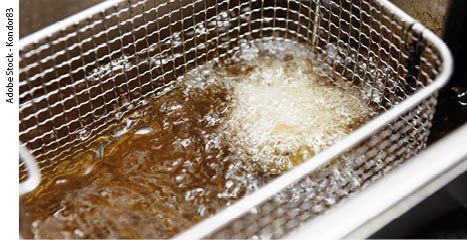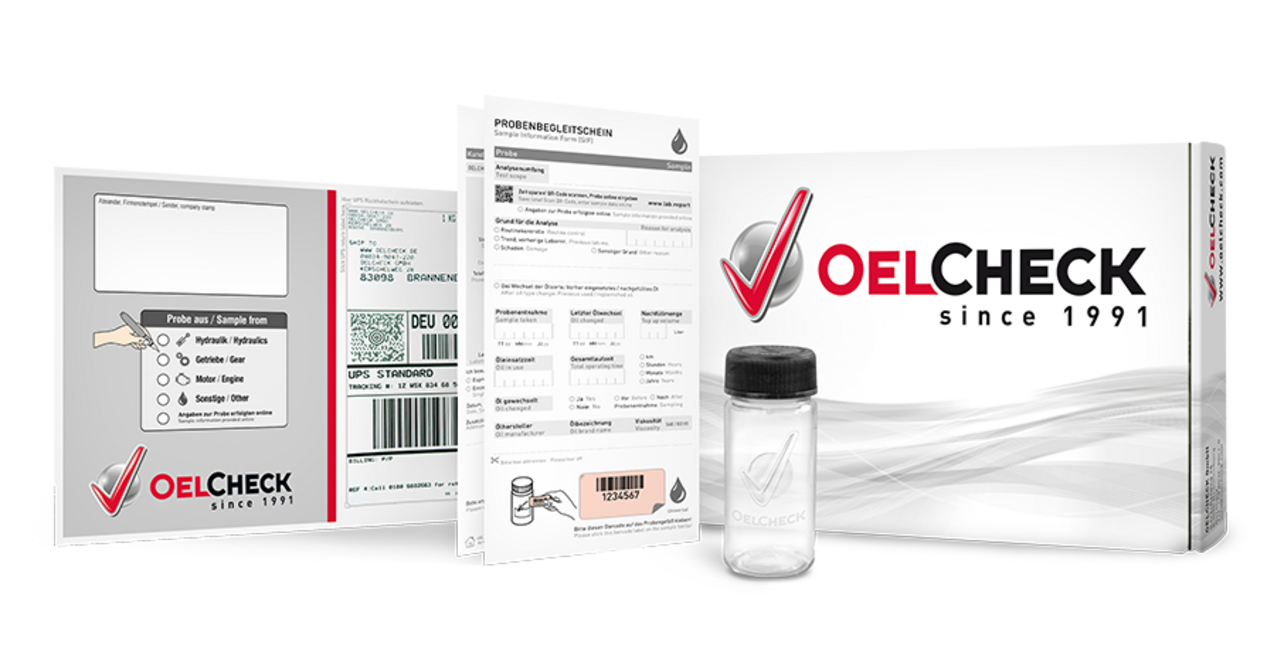Record prices for fuels but the alternatives are limited
Year of publication: 2022
The ever-increasing prices at the filling station are not only putting a strain on the budgets of motorists and freight forwarders. Operators of construction and agricultural machinery, as well as generators, are also struggling with the rising motor fuel costs. Some of them are already considering alternatives to diesel fuel. The scenarios range from biofuels, heating oil, salad oil to even old frying fat. But not every one of these “motor fuels” allows unimpeded operation!
![[Translate to "English"] Rekordpreise für Kraftstoffe](/fileadmin/_processed_/c/f/csm_Spritpreise_1_f931a322e7.jpg)
Table of contents
Heating oil is heating oil and diesel is diesel
In the German-speaking world, a distinction is made between Brennstoff (fuel) and Kraftstoff (motor fuel). Often, both terms are incorrectly used as equivalent. But it’s clear: Brennstoff is used to generate thermal energy and Kraftstoff is used to generate mechanical energy. Heating oil and diesel fuel are very similar, both are so-called middle distillates. The decisive factor is: diesel for motor vehicles in accordance with EN 590 is produced specifically for the operation of internal combustion engines, domestic heating oil in accordance with DIN 51603–1 is specified for use in burners. Engine parameters such as ignition delay (cetane number) are therefore not relevant for heating oil. Nevertheless, the boiling curve specified for domestic heating oil is largely identical to that for diesel. This would make use in a vehicle theoretically and technically possible. In particular, older vehicles with mechanical injection systems or long-stroke diesel engines, such as those used in heavy-duty commercial vehicles, or medium-speed and slow-running diesel engines on ships can deal with “inferior” (not EN 590) fuel quality. A slightly higher ignition delay does not matter here, for example. However, the modern common rail injection systems in passenger cars in particular are sensitive to poorer fuel quality. In order to meet the requirements of today’s applicable exhaust gas regulations, very high injection pressures (up to 2,700 bar) are required to achieve fine atomisation of the fuel and thus optimum mixture formation. This results in extremely high component fits with minimal tolerances. Even the smallest impurities cause major problems here.
Motor oil under constant stress
The sulphur content in heating oil is still up to five times higher than in diesel fuel. This sulphur is oxidised in combustion and converted into sulphuric acid with the concomitant condensate when the temperature falls below the dew point and is introduced into the motor oil via blow-by. There, it must be neutralised by the alkaline reserve (base number, BN). This is thus additionally stressed when heating oil is used, the oil-change intervals are significantly reduced, as the modern low-SAPS oils, as they are standard for vehicles with particulate filters, are not designed for such “motor fuels”. Heating oil can also contain many more PAHs (polycyclic aromatics) than diesel fuel. Together with a possibly lower cetane number, these ensure more sooty combustion in the diesel engine. Once again, the motor oil becomes more stressed. Detergents, which normally dissolve dirt in the oil into fine particles, and dispersants, which hold particles in suspension and transport them to the filter, must be able to handle the additional soot quantity. If a diesel particulate filter is installed, this is more heavily occupied by the additional soot quantity. The result is a faster rise in back pressure, and the particulate filter needs to be regenerated more frequently. This leads to additional fuel entry into the motor oil, as the exhaust gas temperature for soot burn-off in the filter is increased “late” due to increased fuel and shifting of the injection time. Increased oil dilution occurs because the entire fuel is not converted and/or the regeneration cycle is interrupted unexpectedly, e.g. by short-distance operation. The result of the additional fuel input is: the lubricating capability of the oil decreases and increased abrasive wear occurs in bearings and other tribo surfaces.
“Hello – Customs control!”
As described above, heating oil is intended for the generation of thermal energy and is therefore subject to a reduced tax rate in Germany in accordance with the Energy Tax Act. Thus, use to generate mechanical energy and thus in vehicles is prohibited. Use in stationary or mobile emergency power diesel engines or power generators is permitted, as electrical energy is generated here via a generator! Anyone thinking about “charging” their electric vehicle while driving due to the equally high electricity costs with tax-advantaged heating oil and an emergency power generator should note that the tax exemption for heating oil is only valid if the power generator is “stationary” during its use! In order to make the tax reduction recognisable in the market, heating oil is therefore provided with marking substances. Heating oil is very easily recognisable by its red colour. Anyone who refuels their vehicle with heating oil is already committing tax evasion (this is known as readying - 'Bereithalten'), you don't even have to have started the engine! Tax evasion is a crime! Customs carries out regular checks.
Many have (unsuccessfully) tried to remove the red colour, and mixing the heating oil with normal diesel to fade the red colour is one "trick" that is often described. It’s important to know: In addition to the obvious red dye, there are other invisible marking substances that Customs can easily detect in the laboratory. So please: steer clear!
Salad oil and used frying fat
As with heating oil: From a technical point of view, it is possible to refuel with salad oil or frying fat – especially in older diesel vehicles. For newer, heavy-duty commercial vehicles, in particular tractors, OEMs have issued partial approvals for the use of vegetable oil in accordance with DIN 51605. These approvals even exist in conjunction with modern common rail injection systems. However, this often requires adjustments, e.g. the oil change intervals are shortened.
There are other hurdles for private users with their passenger car: the salad oil from the supermarket is not checked according to the above DIN standard, because after all it’s not a fuel, but a food! No passenger car with a modern common rail injection system is approved for vegetable/salad oil. There are several reasons for this: the engine’s ability to start at colder temperatures (already below +15°C) is limited. The higher viscosity and the polarity of the components ensure a poorer atomisation and thus a poor mixture formation. When starting, it "roars around" for a long time and therefore a lot of fuel is injected, but not burned. The cold running phase also leads to increased fuel input, e.g. due to condensation effects on the cold cylinder wall. This entered fuel accumulates in the engine oil due to its high boiling point. It cannot be allowed to evaporate, e.g. over a longer motorway journey with higher oil temperatures. In addition to oil dilution, this enriched fuel also causes other problems: like any natural product, the salad oil is subject to an ageing process, which is accelerated by the high temperatures in the oil. This results in sludge formation, which can clog the oil filter and lead to major engine damage due to insufficient lubrication.
In even hotter regions in the engine, this fuel input can lead to carbonisation. This is often the case behind the piston rings. Increasing coke build-up hinders the free rotation of the rings, so-called ring riders occur when the coke has filled the entire groove from behind. Result: massive abrasive wear on the cylinder liner or wall, but also poor ignition behaviour and uneven engine running due to insufficient compression – the ring clearance increases.
Another reason why salad oil should not be used is its ability to absorb more water. This happens, for example, through tank breathing. This leads to corrosion damage to injection components, and cavitation damage is also a consequence. In addition: Vegetable oil contains acids, which can also cause corrosion damage to the injection and fuel system. The ageing of the salad oil can also lead to problems with the injection system. Deposits form, especially in hot spots. These are typically near the injection nozzles. After an engine stops, there is no cooling by the supplied fuel or by the coolant in the cylinder head. Among other things, the salad oil can form rubber-like deposits that stick to the injection nozzles.
In the case of vehicles with regular or daily operation, such deposits are only formed to a limited extent and “washed off” again the next time the engine is running – vehicles with long service lives will have problems here. Once the deposit formation reaction has started, it continues to run. Result: The nozzle needle of the injection nozzle sticks, the nozzle no longer opens (fully). This leads to starting difficulties, irregular engine running – but also to damages to the injection pump due to high back pressure. The opposite is also possible: the nozzle no longer closes completely due to the deposits, fuel is brought into the combustion chamber in an uncontrolled manner. Result: heavy oil dilution!
Last but not least: the tax!
Salad oil may look cheap on the shelf at the discount store compared to one litre of diesel at the filling station. However, when used as fuel, the corresponding energy tax rate is automatically due as for “normal” fuel. The price of the salad oil is therefore at the same level as standard diesel at the pump – however, the use of diesel from the pump nozzle is clearly less contentious. Because it is also the case here that the use of incorrectly taxed salad oil is tax evasion! Therefore: steer clear! Unless your vehicle is suitable for this purpose without restriction and has been approved for it by the manufacturer, and you tax the oil correctly.
Anyone thinking about using old frying fat is already advised against doing so here! All negative effects described for salad oil also apply to frying fat. In addition, used oil from the deep-fat fryer is thermally pre-stressed due to its previous use. The ageing effects described thus occur earlier and more dramatically. It also contains fine suspended particles that cannot be removed even with a coffee filter. Here, too, the clear recommendation: steer clear! When frying fat is used for the second and final time in vehicle fleets of a quick-service restaurant chain, it is professionally refined beforehand into fuel via refinery processes (e.g. HVO: Hydrotreated vegetable oil in accordance with EN 15940).

The wide range of biofuels
Sealing materials and plastic hoses installed in the fuel system of passenger cars are often not designed for the use of pure biofuels. In some old vehicles, the fuel B100 FAME or even B7 can cause problems such as swelling hoses and leaky connections. The situation is often different for heavy commercial vehicles and lorries. Manufacturers often already offer conversion kits ex works that upgrade the fuel system for the use of bio-oils. In addition, the operating instructions are often adapted.
When switching from conventional diesel to biodiesel (vegetable oil or FAME), the following should also be considered in addition to the conversion: Biofuel also acts as a solvent! Over the years, every vehicle's fuel system has developed a patina of deposits from fuel components. These are removed by the use of pure biofuels and can be found in the fuel filter. If necessary, a shorter replacement interval for the fuel filter should be considered. However, the injection system may also be affected if the dissolved deposits can be filtered. Biofuel can also act as a solvent outside the tank/fuel system: The paint on older vehicles may not be resistant to bio-oil and may be damaged.
Another problem is availability. Biodiesel (not salad oil!), also known as FAME (Fatty Acid Methyl Ester) or B100, was approved for many diesel vehicles at the beginning of the 2000s and was available at many filling stations. That has changed. There are hardly any filling stations that still offer B100. In addition, most approvals for B100 operation in the passenger car sector were withdrawn by the manufacturers. Today, FAME is typically contained as an admixture component in filling station fuel. According to the Ordinance on the Implementation of the Federal Immission Control Act (BImschV), the admixture rate in diesel should be 7%, hence the designation B7. Operators of vehicle fleets have other options here; they can procure corresponding quantities of B100 or diesel fuels with higher FAME admixture (B10 to B30) and deliver them to their fleet via fleet filling stations if the vehicles are suitable and approved accordingly. Here we recommend monitoring the condition of the engine oil via regular oil analyses, as this application is considered a niche by the OEMs and may not be tested as intensively. High safety margins are often built into the change intervals and the intervals are set to be significantly shorter. The quality of B100 and the mixtures (B10 to B30) in the tanks of the fleet filling station should also be checked regularly! The oxidation stability of the bio-component is an important parameter that we can check for you as part of a fuel analysis.
Methanol and ethanol
Most alternative fuels are currently unavailable. Pure alcohol fuels such as methanol and ethanol for use in petrol engines are not actually available from filling stations in Germany. Private supply of alcohol fuels, e.g. from the DIY store, and its use as fuel again entails a tax liability. In addition, the fuel systems are not designed for the use of alcohols, and sealing materials and other plastics are very likely to be damaged. The engines must also be adapted. The energy content of methanol is approx. 50% of petrol, so approximately twice the amount would be required for the same mileage if used. In terms of price, the litre of methanol is around €1. With the necessary additional consumption, you are back on a par with petrol – plus the costs for the conversion/adaptation of the engine and fuel system as well as the tax. In addition, most of the methanol available today is currently produced from natural gas, so there is no environmental benefit.
CNG and LPG
Natural gas such as CNG (Compressed Natural Gas) or LPG (Liquefied Petroleum Gas or often referred to as autogas) are significantly better in terms of availability! There are around 800 CNG filling stations in Germany, and around ten times more for LPG. In order for a petrol engine to be suitable for LPG or CNG, a conversion must be carried out. Whether this is possible depends on the vehicle. Neither fuel has an environmental benefit, the gas is currently mainly fossil; in the case of CNG, biogas can be added in small quantities.
E-fuels
They are an option for the future. Defossilisation and thus the achievement of climate targets in transport can only succeed if CO2-reduced fuels are made available for the existing fleet. However, it will take time for a relevant quantity of these to be available on the market. Political decisions are also still required. If all this is not set in motion, you might have to buy the petrol in the pharmacy again like Bertha Benz...

OELCHECKER Spring 2022, Seite 8



